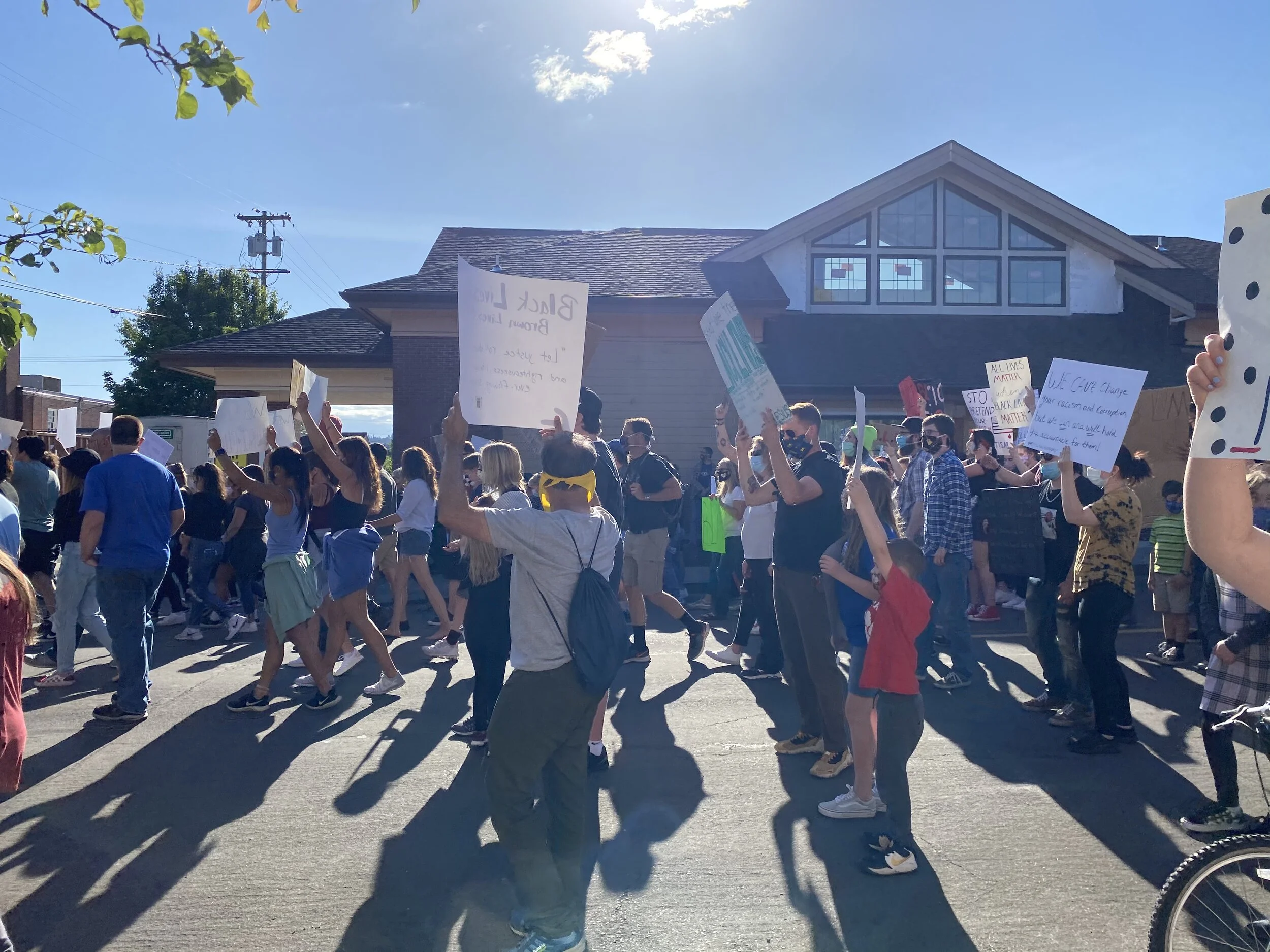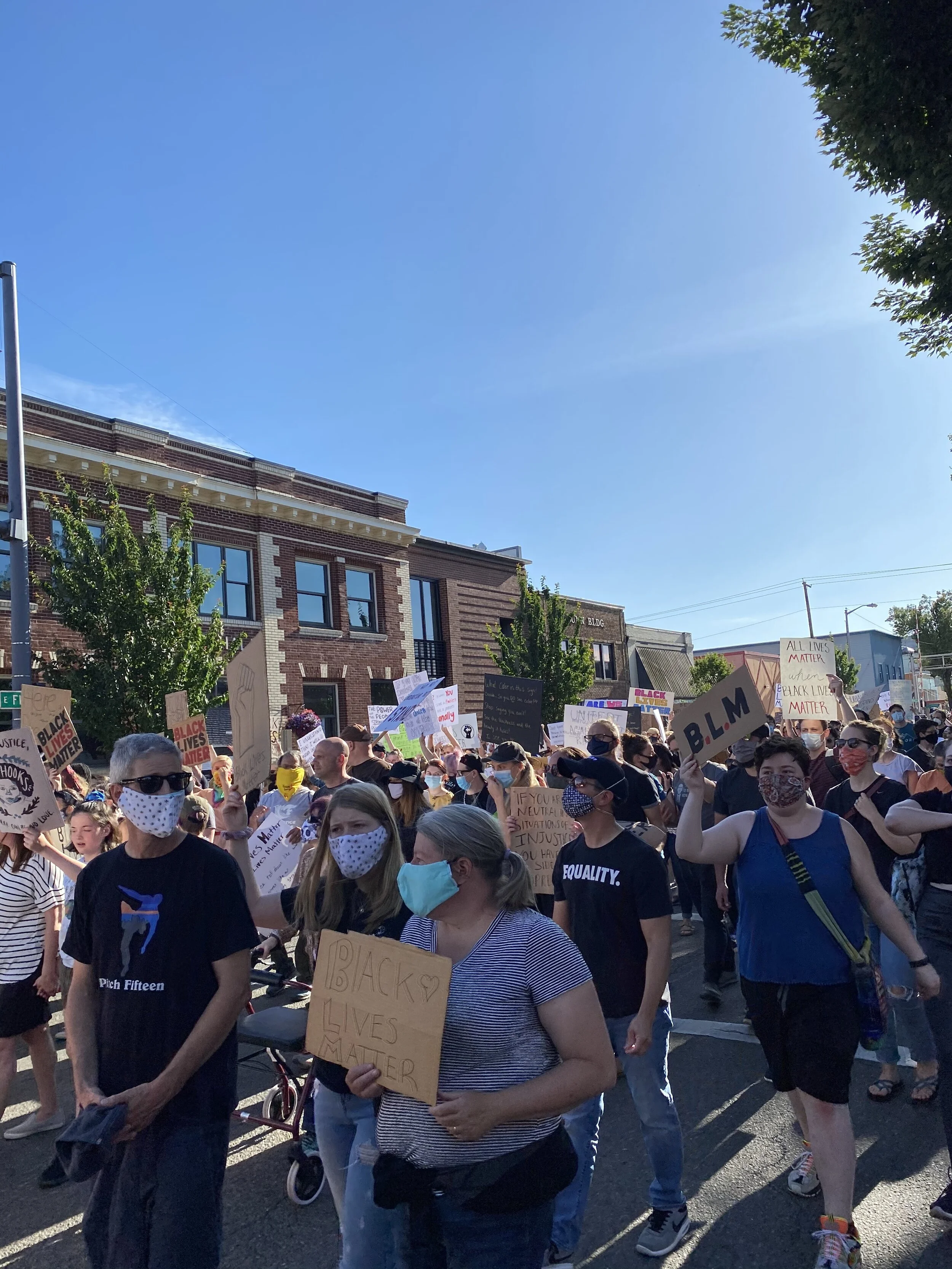When I wielded my white privilege, confessed my racism, listened to police officers, and jumped on the train
I knew what I had to do.
I had become a glutton of pictures, headlines, posts, infographics, articles, and more bizarrely, heartache. I was consuming heartache in gallons. I had made a promise in 2020 to listen to the voices of minorities, but in just a matter of days, I was feeling the pains of empathy intoxication. Consuming so much, feeling so much, anguishing so much, that I started losing my emotional footing. It was all-consuming.
So on May 31st I wielded my white privilege and pulled the plug. No more videos of black men being murdered in plain sight. No more defending good cops. No more rioting footage. No more angry people of color. No more angry white people. No more President tweets. No more scrolling and gasping for hours. No more worrying when I should speak, how I should speak, and what I should say.
I went dark.
I (jokingly) blame Nick, my friend and lead pastor, who implored us through tears on the Sunday morning after George Floyd’s death DON’T DO NOTHING. And as part of doing something, he suggested fasting.
Although many of our church leaders were fasting from certain foods, I knew what I had to do. For 30 days I committed to denying myself things that I mindlessly consumed with the intention of giving more space for God to change me. Yes, that included eating and drinking differently, even spending differently, but most importantly, I committed to fasting from social media.
Almost instantly I felt sobered by it. I started running 3 miles most days (funny how you find the time when you’re not filling your life-margins with scrolling) and when I ran, I listened to podcasts that interviewed people of color. Lots of them. One voice at a time. With no outlet for me to form a response, post, or caption. Just listening.
But one day my friend Beth asked me if I was going to join the Black Lives Matter demonstration in our small town. I was clueless (I was off social media and missed the event announcement) but I was curious and committed. Sometimes you listen and sometimes you have to do more. Walking up to the gathering together was awkward. I felt so uncomfortable. I looked around to see a few uniformed police officers on the outskirts of our gathering, which was a few hundred people. Then the internal dialogue began. Oh no. Would my neighbor who’s a cop see me and think I didn’t appreciate her service? Wait, does it have to be Black Lives Matter OR gratitude for good police officers?
Looking around, I noticed the demonstration was about the same demographic as our community: mostly white. Would the few people of color, all notably very young, feel supported by all these white people showing up or are they too preoccupied trying to defend their culture, their skin, their experiences, their lives? Do I expect their gratitude? And as a young woman of color spoke into the mic, and her anger got louder, why did I cringe a little? And when a black man said the police treated his father a certain way, why did I wonder if his father was exaggerating (because I certainly don’t do that with white people’s stories). Why am I assessing their emotions and stories as they pour their souls out to strangers?
In the 8 minutes and 46 seconds of silence to honor George Floyd, all I could pray over and over was GOD HELP US. My eyes burned and a few tears rolled over my mask.
This is what people have to do to feel heard. Demonstrations, megaphones, and showing their wounds to strangers.
Then the marching to City Hall, a swarm of signs and masks and chants on sidewalks lining our busiest street. Oh gosh, chanting. Do I hate it because of the pressure to chant too in my muggy mask or because I don’t get it? It seems incessantly repetitive. I find myself with my arms crossed and I consciously uncross them, willing my body and mind to be open and not closed off. We stand there unhurried, nothing changing. Reading signs. Occasionally joining the chants. Being a participant and observer at the same time. Leaning into the discomfort. Wanting to be present. Wanting to honor.
Then we start moving, taking our demonstration to other sidewalks and other streets. I feel like a sponge. Absorbing. My instinct to take pictures and curate an articulate post to ‘process out loud’ was silenced by my social media fast. All I could do was be present and it was heavy. When my daughters asked me about it when I got home, all I could muster was how hard it was. Realizing racism, in all its forms, is hard work. Three weeks prior I confessed to them that I was racist. The looks on their faces... they were so confused after I had just explained to them the evil of racism. But then I explained biases and quick judgements. How racism isn’t just the ‘loud hateful people out there’, but also in us. It’s so sticky and subtle. We must pay attention.
It sounds like many parents are having these hard conversations with their kiddos. A week after the protest, a white friend was talking about Black Lives Matter with his white son. His son asked why we don’t say you matter to everyone - not just people of color. His dad’s response was so beautiful. “How would you like it if I looked at you and said, every day, ‘Son, I love everyone’. What if I never told you I loved you?” His son responded that it wouldn’t make him feel very loved. Right.
I thought about my tension with chanting Black Lives Matter and, in the same breath, wanting to express sincere gratitude for good police officers. It would be like me telling Avery “I love you” but then immediately, following it with “.... and Harper”. “I love you Avery.. and Harper” every time. I’m pretty sure it wouldn’t have the same impact for Avery. Or vice versa for Harper. Black Lives Matter AND I’m grateful for good cops. I’m grateful for good cops AND Black Lives Matter. The tension is real and saying them in the same breath didn’t feel honoring to either. Timing, space, and breath matter.
There are three police officers that live within a block of our house. Two work in Portland and, at the height of the protests, worked 19 days in a row suffering harassment and threats on their families. No matter how broken I think the policing system is, I can’t dehumanize good officers. I can’t imagine feeling so misunderstood and hated by the very people they’re committed to protecting. In the last few weeks, friends and neighbors rallied together to honor them through surprise parades and pop-up gatherings with home-made signs, baked goods, and cards. My daughters and their friends did car washes in our neighborhood and raised over $200 - most of it was sent to a local children’s hospital - but some of the funds were used to purchase thank you gifts for the three officers, to honor their hard work and daily sacrifices.
In more private conversations, I listened to the officers’ experiences of people accusing them of racism (even though the instances were driving violations at night, when the officers couldn’t see the skin color of the driver). I heard about them getting flipped off by strangers as they drove by in their squad cars. I heard about the confusion and fear of defunding police and how that would impact the communities that they love and serve. I talked to one of the spouses and could see anguish visible on their body - sleepless nights and debilitating fear were taking a toll. I couldn’t diminish their suffering because others were too.
There’s just so much pain everywhere.
It's all so complicated.
About that emotional footing I so desperately needed at the beginning of my fast... oddly enough it’s here, even in this messy, complicated tension. Being out of the news and off social media (while getting daily updates from my husband) has made me value a few things. For the last 3ish weeks, I’ve listened more than I’ve spoken.
Instead of feeling swept away in a storm of anger with the urge to share, post, or caption to express my solidarity, I stopped focusing on how I should react and instead focused on others. Instead of consuming the next headline, I sat with one story at a time, told directly from people of color. Instead of feeling shame of my white privilege, I learned it’s not a character trait - it’s a byproduct of my culture. Instead of believing the need to give up my white power (because scarcity mindset wants to convince us there’s only so much power in the world), I was reminded that the goal is not to give mine up but to see that others have power too (which may require affirmative action to level the playing field). Instead of trying to be color blind, I’m seeing Blackness – dignity and wounds. Instead of cringing at the loud angry voices of people of color, I saw their need for solidarity and expression. Instead of choosing sides, and after some space and time to absorb the voices of minorities, I listened to officer’s voices too. Instead of dehumanizing some in order to elevate others, I sat in tension. And then I used my voice, not publicly online, but privately with my children and husband.
In one of the podcasts I listened to, Danielle Coke (@ohhappydani) was talking about anti-racism work. She challenged the idea that white people need to pull their seat up to the table and participate. It’s not a table, she explained. It’s a freight train. And it’s hauling. If you’re just now wanting to join, people of color can’t be expected to stop the momentum in order to catch you up and help educate you on how to be anti-racist. Resources are plentiful if you put in some effort. Find books. Listen to interviews. Dig into accurate history. Once you’ve done the work to listen and learn, she implored us to then elevate the voices of minorities – which includes subscribing to their podcasts and reading their books and sharing their work. And then, after you’ve listened and elevated the voices of others, learn how to use your own to advocate. Speaking of advocacy, this morning I listened to an interview with Ebony Clark who suggested that ending racism is a white person’s task (if it were up to blacks, it would have ended long ago). Our white advocacy is essential for change.
So here I am, not ashamed of my Whiteness but well aware of its benefits, and fully convinced of its responsibility to reform broken, unjust systems.
My fast is over but my commitment is not. I’m on the train, unsure of what’s next and certain that I’ll stumble along the way. Maybe I’ll be misunderstood and judged because I’m not doing it the way specific groups want me to – which feels risky and daunting and painful. But ultimately only I can evaluate my intentions – which seems like a wise regular practice. Am I listening? Am I learning? Am I embracing nuance? Am I honoring the complexities? Am I dehumanizing anyone? Am I diminishing suffering? Am I surrounding myself with trusted friends who will challenge me? Am I slow to speak? Am I elevating other voices?
My journey to being anti-racist is bumpy, uncomfortable, and imperfect, but I’m all-in.
God help us.

